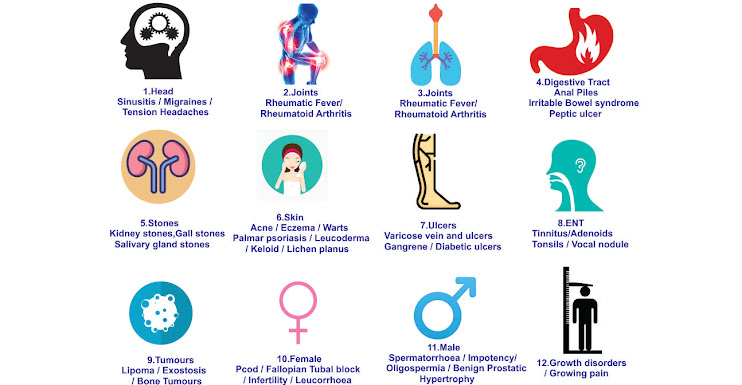About teeth and their functions – Teeth are very hard structures which usually appear as ‘guards at the entrance’ (mouth). Teeth are commonly peg-shaped, which are embedded in the jaws. They commonly function as grinder i.e., masticating the food by chewing, which helps in good digestion. Other than this main function, it also helps in providing good appearance to the face, proper and clear speech by giving room to the tongue, and in case of animals, and sometimes in humans, too, it helps in self-protection by biting. Teeth usually resist decomposition and can resist heat even up to 300 degrees C. So, it can also help in finding out the identity and age with forensic studies. DNA tests can also be done with teeth for finding identity in case of investigations. On ageing, they commonly fall off.
Types of teeth
There are two types of teeth – deciduous and permanent. Permanent teeth are
stronger than deciduous teeth. There are 20 deciduous teeth and 32 permanent teeth. The
deciduous teeth are smaller and whiter than the permanent teeth. The eruption and shedding of the deciduous teeth usually varies with every child. Mostly, first teeth (central incisor) erupt in pairs from the lower jaw when the child is about 6 months old. Then one by one the teeth erupts to have a full set to accommodate the whole jaw before the age of three.
The phenomenon of the deciduous teeth is to provide space or make reservation for the bigger permanent teeth that emerge later. This is mainly because of the lower jaw and facial bones growing fast during childhood. These deciduous teeth persist till the age of seven. Then they fall one by one for giving space for emergence of permanent teeth. Both deciduous and permanent teeth are susceptible to erosion and damage.
Structure of teeth
Tooth is commonly divided into crown and root. Crown is the exposed part whereas roots are buried in the jaws and gums. The gum line part may be called as the neck. The crown consists of three layers. The outermost covering is called enamel. Enamel is the glossy and
hardest substance of the body which protects the tooth. It is made of layers of calcium and phosphorus crystals. Beneath the enamel, a slight yellowish bony dentine layer is present. Usually, it determines the colour of the teeth. The dentine layer is sensitive, since it gets a lot of tubules from the inner pulp which contain blood vessels and nerves. The central soft tissue is called the pulp. It has rich sources of blood and nerve supply. These blood vessels and nerves supply till the end of the root through the root canal and from there they communicate with other structures. The sensitive nerve innervations give the difference in sensation of cold and heat. The root portion of the dentine is covered with a layer called cementum. It is as hard as the enamel but cannot resist erosions or abrasions with chemicals or physical injury like the enamel does. So, if the gums recede, the exposed cementum gets damaged easily and causes sensitive teeth with the exposure of the dentine layer. The sensitiveness of the teeth usually indicates “the need for protection”.
Sensitive teeth
Even though enamel is very hard, it can get damaged with continuous friction, injuries, chemicals and thermal variations. The injured teeth become sensitive teeth due to the exposure of the dentine layer. Sensitive teeth are a discomfort condition where external stimuli like cold foods, drinks and air causing hypersensitivity and pain. The pain may be sudden and shooting and it travels to the root of the teeth. Mostly pain will not persist continuously, but it comes and goes as lightning pain with the causative factors. Pain will be very horrible with intake of ice creams and sweets, sometimes even with hot foods. In course of time, the damaged dentine will get replaced with secondary dentine with less nerve supply for reducing the pain.
Causes – can be classified as different categories:
- Ageing process can cause recession of gums and loss of enamel
- Tooth paste, mouthwashes and mouth fresheners – whitening tooth paste, continuous use of mouthwash and fresheners can cause erosion of enamel to cause sensitivity
- Injury – from brushing with hard abrasive tooth powders or with hard bristles, picking the teeth, teeth grinding, removing the metal caps from bottled drinks with the teeth, biting hair clips can cause enamel loss. The same thing happens temporarily in treatment procedures like teeth cleaning, root canal treatment and crown covering for restoration of tooth.
- Brushing techniques – improper brushing and flossing can also cause sensitivity
- Teeth – decay, erosions, improper fillings, cracked/broken teeth, plaque/tartar deposits, etc.
- Gum diseases – Gingivitis, abscess, sores can spread infection to teeth and it can also cause recession of gums or shrinking while getting healed which usually exposes the cementum in the gum line.
- Foods and drinks – Sour and acidic food, fruits/juices (citrus – lemon, tomatoes, grapes, etc.) sweets, coffee, tea, alcoholic drinks, carbonated drinks with added preservatives can cause erosion. Likewise, very hot or cold drinks can also cause sensitivity.
- Vitamin deficiency (C and D) can cause transverse ridges, pitting and sensitivity.
- Flourosis can cause enamel loss leading to pitting of teeth and white patches in the teeth with sensitivity.
- Acidic PH of the mouth can erode the teeth to cause sensitivity.
- Sucking air or blowing air inside the mouth can aggravate sensitivity due to exposed nerve endings in case of diseased or damaged teeth.
Examination and investigation of the teeth – Teeth should be examined by asking the patient to
grimace so as to show his teeth. It should be examined for colour, numbers, ridging, plaque/tartar deposits, fillings, extractions, shape, structure, surface, root, extra teeth, tilted/twisted teeth, approximation of upper and lower jaw teeth while biting, gums and any other infection in buccal cavity. Commonly, teeth appear brown in case of heavy smoking, tobacco chewing, betel nut chewing and appear as grey with diseases or continuous use of medicines. The root can be analysed with X-ray or CT scan. Infection and diabetes should be ruled out with routine blood investigations.
Diagnosis – Usually, sensitivity and severity is tested by blowing air test.
Prevention of sensitive teeth – You can easily prevent teeth sensitivity by
- Using soft bristle toothbrush to avoid abrasions
- Using right tooth paste
- Brushing up and down and along the gum line carefully for avoiding damage
- Maintaining oral hygiene
- Avoiding use of abrasive tooth powders or coal dust
- Avoiding deposition of plaque and tartar
- Avoiding grinding the teeth
- Avoiding acid foods/fruits and sweets, especially at night
- Avoiding recession of gums by proper care of gingivitis, if any, in the early stages itself
- Rinsing the mouth with water after every meal or snacks or acidic juices.
General treatment for sensitive teeth – Normally, for sensitive teeth, dentists often prescribe a variety of desensitising toothpaste, gels and lotions. These pastes and mouthwashes often mask the sensitivity by benumbing the teeth, as it contains benumbing agents or blocking
agents. In case of caries teeth, proper cleaning and fillings will be performed. If all these fail, advanced dental procedures like white fillings for dentine sealing, covering, root canal treatment, proper filling of the pores/old fillings, etc., are often followed by orthodontists, which will usually work superbly and immediately.
Homeopathic approach
For conserving teeth, ruling out infection, filling the caries or erosion of teeth is most important. The first and foremost thing is removal of the factor which causes friction, infection, etc. Homeopathy treatment is well known for allergy and hypersensitivity. Homeopathy treatment usually won’t benumb the teeth by desensitising the nerves, but it will work for reducing the hypersensitivity and its reaction. It will also work for sealing the dentine layer with quick formation of secondary dentine layer in case of enamel damage. For complete cure, treatment should be started at an early stage.
Usually, pain is always preferred to numbness for conserving the teeth. Instead of benumbing
the teeth and letting the disease damage the teeth further, pain should be preferred. Treating the cause and symptoms with Homeopathic medicines will work excellently for resisting sensitivity.
Homeopathic medicines commonly used in cases of sensitive teeth are Acid nit, Agaricus, Antim crud, Belladonna, Calc carb, Carbo veg, Causticum, Chamomilla, China, Coffea, Hecla lava, Hydrastis, Kali bich, Kreosote, Merc sol, Nat mur, Phosphorus, Plantago, Pulsatilla, Sulphur, Thuja, etc. These Medicines should be taken under the advice and diagnosis of a qualified Homeopath.
for new hope
Dr. S. Chidambaranathan, BHMS, MD (Homeo)
Laxmi Homeo Clinic
24 E. New Mahalipatti Road
Madurai, TN 625 001
India
Tel: +91-452-233-8833 | +91-984-319-1011 (Mob)
Fax: +91-452-233-0196
E-mail: drcheena@yahoo.com
www.drcheena.in
Related Searches :
Homeopathy Doctor in madurai, Best Homeopathy Doctor in Madurai,Homeopathy hospital in madurai, Best Homeopathy hospital in madurai,Homeopathy treatment in madurai, Best homeopathy treatment in madurai,Homeopathy doctors in madurai, homeopathathy consultant in madurai,homeopathy madurai, homeopathy hospital near madurai, best treatment homeopathy madurai,list of homeopathy doctors in madurai, dr chidambaranathan homeopathy madurai,drchidambaranathan homeopathy doctor madurai,drchidambaranthan homeopathy,hospital madurai,laxmi homeo clinic madurai.
(Disclaimer: The contents of this column are for informational purpose only. The content is not intended to be a substitute for professional healthcare advice, diagnosis, or treatment. Always seek the advice of healthcare professional for any health problem or medical condition.)







 • We aim for Comfort First and Cure Next
• You will be in safe hands experienced more than 25 years.
• We can provide Best solution and Customized treatment plan for your sufferings.
• You will be directly under the personal care of Chief Doctor and not with juniors.
• As we had handled all sorts of cases in and abroad, we can guide you to choose effective treatment.
• Further, if required to control the disease at the earliest and to be in safer side and in Incurable diseases, to improve quality of life, we can also advice you to integrate Homeopathy with Allopathy
• Your treatment remains confidential with us by all means
• We aim for Comfort First and Cure Next
• You will be in safe hands experienced more than 25 years.
• We can provide Best solution and Customized treatment plan for your sufferings.
• You will be directly under the personal care of Chief Doctor and not with juniors.
• As we had handled all sorts of cases in and abroad, we can guide you to choose effective treatment.
• Further, if required to control the disease at the earliest and to be in safer side and in Incurable diseases, to improve quality of life, we can also advice you to integrate Homeopathy with Allopathy
• Your treatment remains confidential with us by all means 